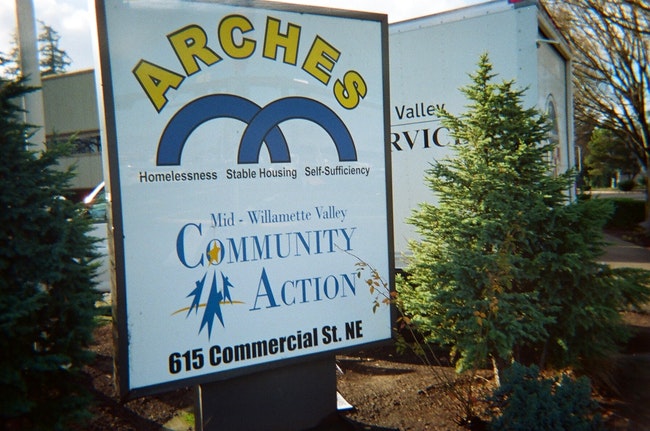 The sign at The ARCHES Project. (Anthony McGuire/Special to Salem Reporter)
The sign at The ARCHES Project. (Anthony McGuire/Special to Salem Reporter)
NOTE: Salem Reporter is providing free access to its content related to the coronavirus as a community service. Subscriptions help support this.
Ted Messer rides around Salem on his bike with his dog, Diggity, sitting in a bike trailer behind him.
The homeless man shook off concerns about COVID-19.
“I can’t even put a tent up,” Messer said Monday, referencing Salem’s ban on planting tents on public property.
In the morning, he said he washes his hands using a jug of water between his knees. He also has hand sanitizer, but mostly relies on that as a fire solvent.
Messer said his exposure to the elements gives him a stronger immune system.
Another man, who identified himself only as John, expressed the same sentiment.
“I’ve got an immune system as strong as a horse,” John said, adding that as a homeless person, his hands are in the dirt most days.
He said he’s gotten pneumonia multiple times and isn’t worried about the novel coronavirus.
John said he washes his hands at public restrooms, but he’s more concerned about being assaulted on the street than contracting an illness.
Despite the men’s cavalier attitude, homeless service providers in Marion County are preparing in case a COVID-19 outbreak occurs in the homeless community.
Homeless people are more susceptible to virus spread because they lack regular access to hand washing and the ability to quarantine. Health officials are warning that places where people congregate, like in shelters or standing in line for a warm meal, can make people more susceptible to the spread of the virus.
On Monday, March 9, Marion County released a recommendation list for area service providers which included separating homeless people with respiratory illnesses six feet away from others, serving meals outside if possible and increasing the frequency of cleaning. The Salem area has about 1,800 homeless people who live on the streets, in their vehicles, in shelters or doubled up in other housing.
The area’s main homeless service provider, the Mid-Willamette Valley Community Action Agency, is adopting a four-phase approach to the virus.
As of Wednesday, March 11, the agency was in phase one, focused on prevention. That includes daily cleanings of high traffic areas like the day center and restrooms, improving personal hygiene and socially responsible behaviors like stocking tissues and avoiding face touching and hand shaking.
The other phases progress from social distancing to environmental control.
On Tuesday, the agency’s executive director, Jimmy Jones, said the organization isn’t isolating people yet but will likely have to take additional steps as the week unfolds.
Ashley Hamilton, director of The ARCHES Project, said on Wednesday the agency has focused its attention on preparing for an outbreak.
She said they are working to assess gaps in supplies, communicate risk and engaging a larger network to create a community-wide response.
“Not only are our clients among the most vulnerable in our community, but we also have staff among us, and family members, that are relying on us to play our part in reducing risk,” Hamilton wrote in a staff email dated March 5.
The agency is advising employees who are sick to stay home and that it could modify services or take other staffing measures if the novel coronavirus spreads throughout the community.
DJ Vincent with Church at the Park said the shelter is seeking to meet the 6-foot mat distance and has increased its cleaning of surfaces.
Leaders at two of the area’s warming shelters — First Presbyterian and Safe Sleep — didn’t return emails seeking comment about any changes at shelters Wednesday.
On Thursday, Robb Thrasher said First Presbyterian made the decision two weeks ago not to open its warming site because of its partnership with Little Friends Montessori School.
“The warming network flexed with us by opening Capitol Park Wesleyan Church–they do not have a school population in their facility,” Thrasher said in an email.
Dan Clem, executive director of Union Gospel Mission, didn’t return calls seeking comment about any changes at the shelter in response to the coronavirus.
Last week, Jones said staff at The ARCHES Project were talking to homeless people one-on-one about the importance of regular hand washing.
The agency bought bulk supplies of hand sanitizer, gloves, disinfectant wipes and tissues.
In the West Coast’s larger cities, officials are planning on spending millions to clean shelters and quarantine homeless people in motels.
On Monday, San Francisco announced plans to spend $5 million to clean homeless shelters, permanent supportive housing and city-funded single-room occupancy hotels daily.
In Washington, King County officials faced backlash over a plan to quarantine coronavirus patients in a motel.
A health official in Sacramento said the plan is to use a local motel if homeless people need to be isolated.
This story was updated on March 13 to add additional comments from service providers.
Have a tip? Contact reporter Saphara Harrell at 503-549-6250, [email protected] or @daisysaphara.









